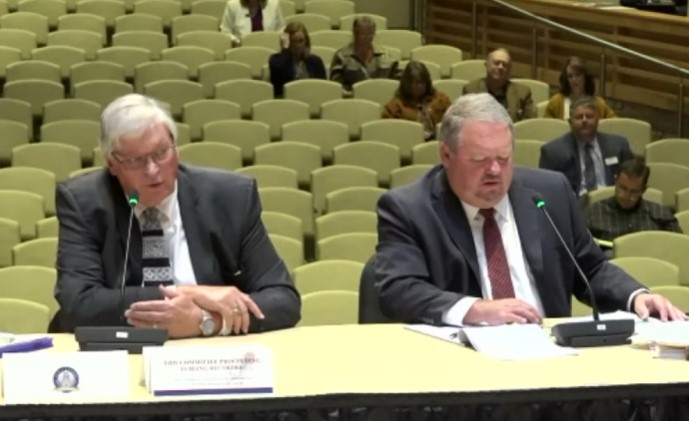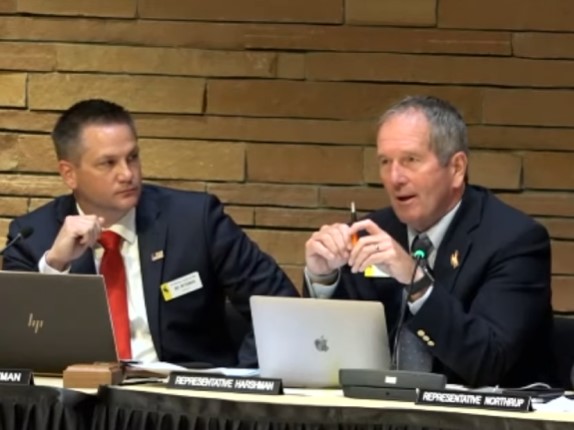Lawmakers Consider Copying California’s Property Tax System
Consultant says a switch to acquisition value would bring challenges
- Published In: Politics
- Last Updated: Oct 03, 2023

Ed Crapo (at left) and Robert Lee (at right) of TEAM Consulting LLC present their report on Wyoming’s possible switch to acquisition value during a Monday meeting of the Joint Revenue Committee in Casper. (Courtesy photo from the Wyoming Legislature via YouTube)

By CJ Baker
Special to the Wyoming Truth
Wyoming politicians tend to avoid anything tied to California, but at least for the moment, they’re considering whether to copy the West Coast’s approach to property taxes.
On Monday, members of the Wyoming Legislature’s Joint Revenue Committee began sifting through a host of possible ways to deliver property tax relief, including a complete overhaul of how the state values property.
Wyoming has always based its taxes on an estimate of a property’s fair market value. However, amid a surge in real estate prices, there’s been a push by some lawmakers and members of the public to switch to acquisition value. That approach ties a property’s taxes to what the owner originally paid for it, though with annual adjustments for inflation.
Lawmakers commissioned a study of the subject during last winter’s General Session, and despite receiving a less-than-encouraging report, the Revenue Committee indicated it would continue to consider the possibility.
TEAM Consulting, a Micanopy, Florida-based firm that specializes in property assessment, researched the subject for Wyoming and delivered a 54-page report that raised concerns about emulating California’s Proposition 13.

“There was a sense from some of the people that we interviewed that we’re trying to fix a problem that doesn’t exist — that Wyoming, like most of the rest of the country, has faced a one-time unique circumstance of economics,” said Ed Crapo, TEAM consultant and longtime Florida assessor, referring to the post-pandemic surge in prices that’s more than doubled homeowners’ taxes in some parts of the state.
While residential property values spiked 16% in 2022 and 18% this year, they’d ranged between 2.9% and 6.5% in the prior eight years, according to data compiled by Wyoming assessors.
Another common remark, Crapo said, was that a switch would simply trade one valuation for another without providing relief.
“The values are still going to go up. Taxes are still going to go up,” he said. “Because you’re not addressing taxes, you’re addressing valuation.”
TEAM Consulting also concluded a host of changes would be needed for a shift, including rewrites of state law, new computer software, additional staff in assessors’ offices and an amendment to the Wyoming Constitution.
Whether the consultant overstated the difficulty of the task was the subject of debate on Monday, but regardless, Rep. Bill Allemand (R-Midwest), argued the challenge is worth it.

“It’s going to take some work, but let’s do it and let’s get it right,” Allemand told the committee, “because this system right now, we’re raping our people.”
Unhappy taxpayers
The Legislature delivered some relief during its winter session by expanding a property tax refund program that assists lower income residents. Department of Revenue data shows that, after refunding $1.85 million to 3,085 homeowners a year ago, the state returned $8.26 million to 8,813 people this year. But residents have called on legislators to do more.
Though it was a fraction of the crowd that packed its June meeting in Sheridan, the Revenue Committee heard from a number of frustrated taxpayers on Monday. The stories included people who fear they’ll be unable to keep up with skyrocketing taxes and lose their homes.
Carroll Trader, a Casper-resident who served in the U.S. Marine Corps, said a $325 veteran’s discount he received last year was followed by a $745 tax increase this year. Trader said acquisition value would offer a fairer system than the current one, which involves comparing similar properties.
“Just because the idiot up the street pays twice as much for the same house I got, I should not have to pay his taxes — and that’s what … this state has done,” he said of the current system, which speakers likened to a tax on unrealized capital gains.
As she’s watched more development and people come to Natrona County, Susan Martin said she sees “whiffs of what happened in California,” where she used to live.
“Every year it’s becoming scary when your property tax comes in,” added Martin, who also received a $700 increase.
Commenters frequently spoke of their desire for predictable taxes.
Report under fire
TEAM Consulting concluded a switch to acquisition value would mean losing $1.72 billion worth of tax revenue over 10 years. However, former Johnson County Assessor Cindy Barlow suggested the focus should be on property tax collections jumping 80% since 2017.

She also faulted the study on several levels, arguing it underestimated how much money would be collected under the acquisition method and used aggregated information from the St. Louis Federal Reserve Bank and Zillow instead of Wyoming data.
“I find it, as a taxpayer, appalling that we would pay a bill of $48,000 when we’ve received a subpar study,” she said.
Meanwhile, some lawmakers faulted TEAM Consulting for not surveying taxpayers, with Sen. Bob Ide (R-Casper) saying the report felt “biased toward the receivers of property taxes instead of the givers of property taxes.”
Crapo said the study was only meant to identify the feasibility of switching to acquisition value, not solve a taxpayer’s problem.
“We were not asked to look into how best to cure these windfall taxes …,” he said.
Rep. Mark Jennings (R-Sheridan), who led the push for the study, also raised concerns about TEAM Consultants’ report, but called it a starting point, encouraging the committee to move toward acquisition value.
“I think the people want this,” Jennings told the committee. “They need the stability, and they deserve the stability. We cannot continue to have runaway spending and runaway taxation.”
Next steps

Sen. Troy McKeown (R-Gillette) said lawmakers are just shuffling dollars around unless they reduce spending.
“… The burden is still there,” McKeown said. “And whether you target property tax, sales tax, toilet paper tax, eventually some cut has to be made or there truly is no tax relief.”
While the state’s spending has been criticized by some conservatives, property taxes don’t go to the general state budget. Most of the dollars go to K-12 education, followed by local governments like counties, fire districts and community colleges.
“I feel like there’s some lack of understanding about where taxes go,” Rep. Ember Oakley (R-Riverton) said, after Allemand spoke of cutting state spending.
The Revenue Committee asked staff to draft the legislation needed to make a switch to acquisition value, with the intent of fully debating the measure at its November meeting. Committee Co-chair Rep. Steve Harshman (R-Casper) has signaled his opposition to acquisition value, telling a constituent in June that Proposition 13 has been “a total disaster.” On Monday, he indicated that he preferred some of the other options under discussion.
Relief options on the table include a tax exemption for longtime homeowners and limiting annual tax increases to 6% on residential properties. Any bills endorsed by the panel need approval from the full Legislature to become law.













